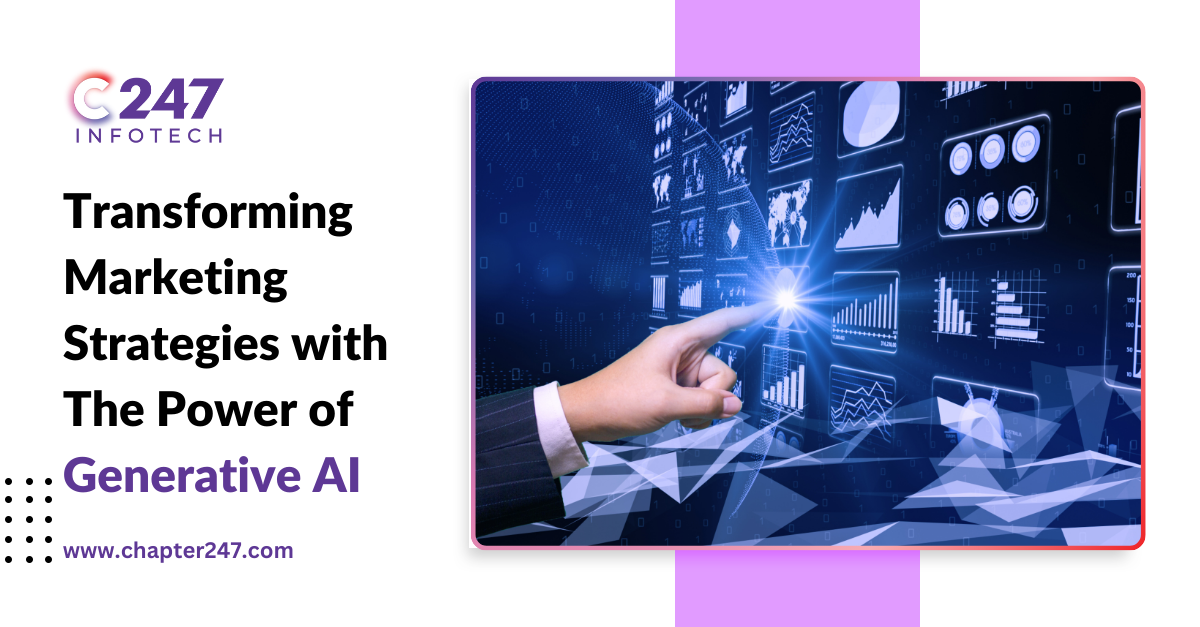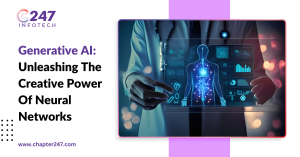In the modern world of cutthroat competition, it is imperative to keep on innovating and evolving. Marketing is one of the many fields that have experienced a metamorphosis because of Generative AI. This emerging tool is transforming marketing platforms, presenting new methods for interacting with customers, and enhancing marketing initiatives.
According to Statista, the market for artificial intelligence in marketing is expected to grow from $27.4 billion in 2023 to an astounding $107.4 billion by 2028. Now let us discuss Generative AI and its implications for the marketing field and the importance of integration for today’s organizations.
The Changing Face of Marketing
Marketing is a concept that has changed a lot in the past few years, from the simple broadcasting of messages. Modern management strategies require a business to disseminate the correct information to the proper recipient at the right time, coupled with timely analysis of available data. Marketing Hire reports that 68% of marketers use AI in their daily work.
The Power of Personalization
Generative AI is a category of Artificial Intelligence that produces material text, images, audio, and others based on neural networks. It imitates human work, channeling creativity, and comes up with content that is as close to human initiative as possible. Its primary strength lies in the possibility of providing individualized content at the level of the population.
Compared to other approaches, Generative AI can process unlimited amounts of information to create individual materials for every client. Think about a message, which is sent to your particular email and contains recommendations of products that you might be interested in based on your previous actions. Generative AI brings this level of targeting, hence increasing customer interaction and conversion numbers.
Efficient Content Creation
Writing and creating content consumes time and other resources, but Generative AI speeds up the development of quality content. It has proven particularly useful for producing large volumes of content in the form of blog posts, product descriptions, and social updates while preserving quality. Thus, marketing managers can spend more time on strategy and less on the issues of creating some pieces of content.
Enhanced Customer Insights
Generative AI helps understand customer needs and wants as it involves the analysis of big data. It reveals hidden chronology that a human might not find, relationships between factors or phenomena, and trends that can help make better marketing decisions. These insights allow marketers to adjust their approaches better and guarantee that their handed materials will be attractive to the targets. Influencer Marketing Hub reports that 54.5% of marketers think AI will improve their marketing efforts.
Real-time Engagement
Consumers today demand to be engaged through devices in real-time with brands. Generative AI helps this task since it automates replies to questions, comments, and messages. Generative AI or chatbots can avoid clients’ waiting time and increase efficiency, thus liberating people for more meaningful work. Such real-time interaction is beneficial for creating better relations with customers and enhances the level of satisfaction. According to Martech research, 61.4% of marketers have used AI in their marketing campaigns. This figure highlights how AI is being used more and more to improve marketing tactics.
Predictive Analytics
With generative AI, predictive analytics is further enhanced through the creation of future scenarios and simulations using past data. For instance, retail marketing enterprises can test the effect of pricing strategies, marketing promotions, and other factors on sales figures and ascertain the best way to use their marketing resources. Because of this predictive feature, businesses can prevent or avert occurrences that are not profitable.
Challenges and Ethical Considerations
As ideal as Generative AI is, it presents problems and many ethical dilemmas, for example, on how AI-generated work can be faked for evil intentions. They recommend that the practical measures of ethical guidelines and responsible use policies must be developed. Preserving confidentiality and, at the same time, delivering the correct information is just as crucial to maintaining customer trust.
Conclusion
Exploring generative AI in marketing, one discovers it equips marketers to produce fresh content, generate content at scale, analyze customers, furthermore, interact in real-time, as well as predict the future. By applying and implementing Generative AI, organizations must do so with ethical principles, particularly in the complex society of today’s world.
Marketers don’t just consider it a tool; it has become an enabler and a disruptor of the marketing function. Marketing is shifting to a new paradigm, and generative is the future of marketing now. Those who will take this opportunity will thrive in this competitive world and those who don’t will be left behind. So, grab the opportunity and partner with Chapter247 and reach a new level of success.








